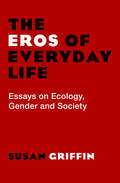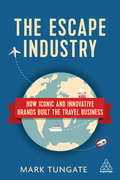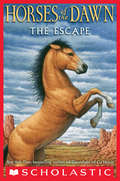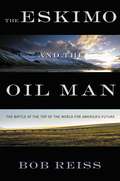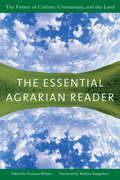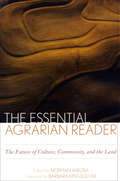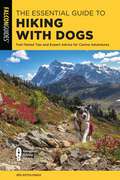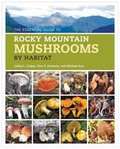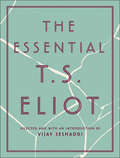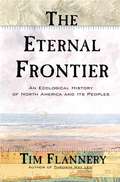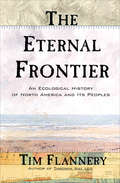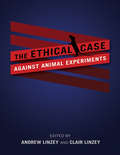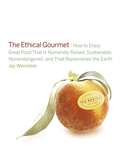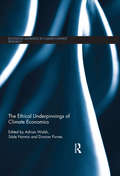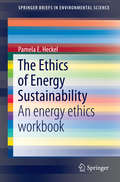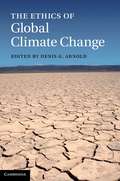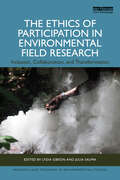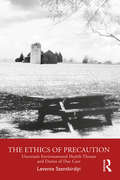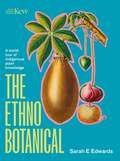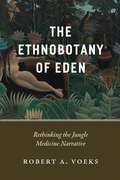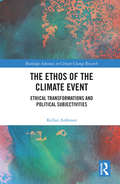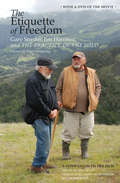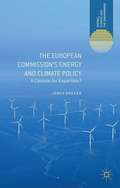- Table View
- List View
The Eros of Everyday Life: Essays on Ecology, Gender and Society
by Susan GriffinA brilliant collection of thought-provoking essays on gender, nature, passion, and society from an acclaimed feminist, philosopher, and poet In The Eros of Everyday Life, one of America's most provocative writers and thinkers offers insightful and compelling views on a wide range of social, ecological, and gender issues. From a distinctly feminist point of view, Susan Griffin explores the intricate connections between science and religion, nature and society, women and men, and love and consciousness. She brilliantly commingles lyrical memoir with cogent social commentary, producing a colorful literary tapestry that examines contemporary life and culture, its contradictions and complexities, and the rise of new ideologies. The Eros of Everyday Life showcases a decade's worth of the very best writing by this acclaimed Pulitzer Prize and National Book Critics Circle Award finalist. It is an enthralling anthology that reveals the ways in which Western society undermines itself by diminishing both woman and the natural environment, and yet it is also a celebration of the power of passion, and the remarkable evolution of the human capacity for love.
The Escape Industry: How Iconic and Innovative Brands Built the Travel Business
by Mark TungateTravel as a concept is universally attractive and the opportunities for fun, engaging branding and marketing in this sector are arguably limitless. Glamour and appeal aside, travel is a hugely competitive, multi-million pound industry and marketers of all sectors can learn important lessons from it. Catering for mass consumer travel, from business travel and adventure travel, to specialist and niche interests, the providers of escape have been impacted as much by technology as they have by the changing habits and desires of travellers themselves. The Escape Industry presents an expert view of travel marketing and branding, focusing particularly on how travel has been utterly transformed for both consumers and providers since the beginning of the 21st century. Mark Tungate focuses on some of the travel industry's most famous brands and shares how all marketers can learn from the industry's rich experience of digital transition.Tungate traces the evolution of this fascinating industry, from nineteenth century trailblazers such as Thomas Cook and The Ritz, to today's innovations such as TripAdvisor, Couchsurfing and Airbnb, and explores the branding secrets that have enabled them to survive. A lively read full of incidents, anecdotes, unexpected encounters and a ground-breaking report from the final frontier and space tourism, The Escape Industry is at the cutting edge of this attractive sector, examining some of the biggest names in the industry. It will take travel and tourism students, as well as marketing and branding practitioners, on a journey to the heart of a rapidly changing business.
The Escape: The Escape (Horses of the Dawn #1)
by Kathryn LaskyGet ready for a wild run in bestselling author Kathryn Lasky's brand-new middle grade animal fantasy series.The horses are in danger. They were rounded up by the two-legs and forced onto a boat to cross the wide ocean. The journey went badly and the boat was deemed too heavy, so the two-legs forced the horses into the sea and sailed away, leaving the herd to die in the deep.By a miracle, the horses survived and made it to land. All but one -- the ghost horse, the leader of the pack. Now it's up to her daughter, only a filly, to take charge of the terrified herd. Stranded in a new land, surrounded by two-legs, will the horses find a way to live safe and free?
The Eskimo and the Oil Man: The Battle at the Top of the World for America's Future
by Bob ReissThe Arctic century is upon us. A great jockeying for power and influence has erupted among nations in the high north. At stake are trillions of dollars in profit or loss, US security, geopolitical influence and the fate of a fragile environment as well as the region's traditional people. As the ice melts and oil companies venture north, the polar regions may become the next Panama Canal, the next Arabian Peninsula-places on earth that remain relatively unknown in one century and become pivotal in the next. Now Shell oil plans to sink exploratory wells in the pristine waters off the North Slope of Alaska-a site that the company believes contains three times as much oil as the Gulf of Mexico.THE ESKIMO AND THE OIL MAN tells this story through the eyes of two men, one an Iñupiat Eskimo leader on Alaska's North Slope, the other the head of Shell Oil's Alaska venture. Their saga is set against the background of an undersea land rush in the Arctic, with Russian bombers appearing off Alaska's coast, and rapid changes in ice that put millions of sea mammals at risk. The men's decisions will affect the daily lives of all Americans, in their cities and towns and also in their pocketbooks. The story begins as a fight and ends with a surprise.In the spirit of Thomas L. Friedman's Hot, Flat, and Crowded, bestselling author Bob Reiss traveled in America's High North over three years and spent time with scientists, diplomats, military planners, Eskimo whale hunters and officials at the highest levels of the government. He traveled to remote villages and sailed on a US icebreaker. THE ESKIMO AND THE OIL MAN reflects the issues dividing every American community wrestling with the balance between energy use and environmental protection, our love of cheap gas and the romance of pristine wilderness.
The Essential Agrarian Reader: The Future of Culture, Community, and the Land
by Barbara Kingsolver Norman WirzbaAgrarian philosophy, a compelling worldview with advocates around the globe, encourages us to develop practices and policies that promote the sustainable health of the land, community, and culture. <P><P>In this remarkable anthology are fifteen essays from Wendell Berry, Vandana Shiva, Wes Jackson, Gene Logsdon, Brian Donahue, Eric Freyfogle, David Orr, and others. The Essential Agrarian Reader calls us to celebrate the gifts of the earth, through honest work and respect for the land.
The Essential Agrarian Reader: The Future of Culture, Community, and the Land
by Norman Wirzba“Eminently quotable and passionately argued essays” on living in harmony with the earth and each other, by Wes Jackson, Wendell Berry, and more (Library Journal, starred review).Includes a Foreword by Barbara KingsolverA compelling worldview with advocates from around the globe, agrarianism challenges the shortcomings of our industrial and technological economy. Not simply focused on farming, the agrarian outlook encourages us to develop practices and policies that promote the health of land, community, and culture. Agrarianism reminds us that no matter how urban we become, our survival will always be inextricably linked to the precious resources of soil, water, and air.Combining fresh insights from the disciplines of education, law, history, urban and regional planning, economics, philosophy, religion, ecology, politics, and agriculture, these original essays develop a sophisticated critique of our culture’s current relationship to the land, while offering practical alternatives. Leading agrarians, including Wendell Berry, Vandana Shiva, Wes Jackson, Gene Logsdon, Brian Donahue, Eric Freyfogle, and David Orr, explain how our goals should be redirected toward genuinely sustainable communities. These writers call us to an honest accounting and correction of our often-destructive ways. They suggest how our society can take practical steps toward integrating soils, watersheds, forests, wildlife, urban areas, and human populations into one great system—a responsible flourishing of our world and culture.
The Essential Guide to Hiking with Dogs: Trail-Tested Tips and Expert Advice for Canine Adventures
by Jen SotolongoWith The Essential Guide to Hiking with Dogs, you and your four-legged friend can be ready for anything the wilderness might throw at you. Set yourselves and others up for the very best hiking experience. Need-to-know topics are covered for the novice hiker or new owner, from trail etiquette to leave no trace ethics, important gear and packing guides to essential commands you should train on the trail. Featuring beautiful and illustrative photography, this must-have guide will inform and inspire any adventure dog and their parents. Inside you&’ll find:Tips for minimizing impact on the trail and practicing dog hiking etiquette.Gear and packing lists.Multi-sport information including camping, backpacking, mountain biking, and paddle boarding with your dog.The very best hike to take with your dog in every state.
The Essential Guide to Rocky Mountain Mushrooms by Habitat
by Vera Evenson Michael Kuo Cathy CrippsFrom grassland fairy circles to alpine nano-shrooms, the Rocky Mountain region invites mushroom hunters to range though a mycological nirvana. Accessible and scientifically up-to-date, The Essential Guide to Rocky Mountain Mushrooms by Habitat is the definitive reference for uncovering post-rain rarities and kitchen favorites alike. Dazzling full-color photos highlight the beauty of hundreds of species. Easy-to-navigate entries offer essential descriptions and tips for identifying mushrooms, including each species' edibility, odor, taste, and rumored medicinal properties. The authors organize the mushrooms according to habitat zone. This ecology-centered approach places each species among surrounding flora and fauna and provides a trove of fascinating insights on how these charismatic fungi interact with the greater living world.
The Essential Guide to Wood Pallet Projects: 40 DIY Designs—Stunning Ideas for Furniture, Decor, and More
by Samantha Hartman Danny DarkeRustic meets modern with this charming do-it-yourself guide. Here are 40 easy-to-follow designs, ranging from coffee tables and wine racks to decorative wall art, all with step-by-step and clear full-color photographs. Perfect for those looking for simple and creative ways to decorate their homes. Wooden shipping pallets have found an unlikely second life: beautiful, handcrafted home décor without the designer price. The DIY market has long been drawn to refurbishing furniture and interior design on a budget, but easily accessible wood pallets have opened up all-new and inspiring ways to personalize a home in an eco-friendly, low-cost way. Beginner and veteran DIYers alike can take delight in crafting various furniture and décor that will impress and inspire without breaking the bank. Included within are instructions on how to make the following projects: Hanging ShelfDeck ChairWall-Hanging Mason Jar OrganizerPallet-Mounted Bottle OpenerWall-Mounted Coat RackSconcesDoor Handle Serving TrayPallet Arrow Wall ArtOutdoor Flower BoxFlower Arrangement CenterpieceClothes Pin Picture FrameRustic NightstandShabby Chic ToolboxFarmhouse Spice RackFarmhouse Wall ClockTealight Candle HoldersAnd more! With wooden pallets, the scope of the project is boundless, and warehouses and stores are happy to give them away for free. What was once a scavenger hunt and test of skill for experienced DIYers can now be an easy weekend project for even the newest of crafters. Take pride in creating imaginative home stylings with found and reclaimed materials that will help the environment, save you money, and make your home even more lovely!
The Essential Outdoor Gear Manual: Equipment Care and Repair for Outdoorspeople
by Annie GetchellThis book covers repairs on the trail or at home. Techniques range from patching a rain jacket to patching a canoe, fixing broken zipper slides to reweaving snowshoe webbing, cleaning campstove jets to filing ice axe teeth. Getchell augments her concise hands-on instructions with numerous anecdotes from outdoor experts, creating a rich, captivating blend of field-based, real-world knowledge guidance. This comprehensive, multisport reference covers climbing hardware, tents, sleeping bags, hiking boots, binoculars, to name a few. The emphasis is as much on care as repair, since more of the former means less of the latter. Appendices offer trail-tested repair kits for specific activities, knots stitches, adhesives, nontoxic cleaning solutions.
The Essential T.S. Eliot
by T.S. EliotA selection of the most significant and enduring poems from one of the twentieth century’s major writers, chosen and introduced by Vijay SeshadriT.S. Eliot was a towering figure in twentieth century literature, a renowned poet, playwright, and critic whose work—including “The Love Song of J. Alfred Prufrock” (1915), The Waste Land (1922), Four Quartets (1943), and Murder in the Cathedral (1935)—continues to be among the most-read and influential in the canon of American literature. The Essential T.S. Eliot collects Eliot’s most lasting and important poetry in one career-spanning volume, now with an introduction from Vijay Seshadri, one of our foremost poets.
The Eternal Frontier: An Ecological History of North America and Its Peoples
by Tim FlanneryIn "The Eternal Frontier," scientist and historian Flannery tells the story of the geological and biological evolution of the North American continent, from the time of the asteroid strike that ended the age of dinosaurs 65 million years ago, to the present day.
The Eternal Frontier: An Ecological History of North America and Its Peoples
by Tim FlannerySixty-five million years ago, a meteor six miles wide smashed into the Gulf of Mexico, ending the age of dinosaurs and devastating the North American continent. Starting with this catastrophic event, The Eternal Frontier recounts the extraordinary ecological history of North America, showing how the continent originally came into being and eventually transformed into the landscape we know today. This sweeping, multidisciplinary book is history on an epic scale. Tim Flannery, a world-renowned paleontologist, traces the postmeteor rebirth of plants, animals, climate, and landforms. He describes a time when rain forests flourished in Greenland and when giant long-necked camels and fat aquatic rhinos thrived in North America’s golden age. He explores the massive changes wrought by the ice ages and shows how geological and climatic forces shaped both the autumn foliage in New England and the cacti in the Sonoran Desert. As the story moves across vast distances of time and geography, we eventually witness the impact of the human race. Flannery imagines the first humans to have immigrated 14,000 years ago, after the recession of the last ice age, and he explains how the pioneering Clovis hunters exterminated an ice-age fauna, including enormous mammoths and mastodons and half-ton lions. The story continues right up to the present, covering the deforestation of the Northeast, the decimation of the buffalo, and other facets of the impact of frontier settlement and the development of modern industry and commerce. The Eternal Frontier is science writing at its best, combining an enormous wealth of fascinating information with engaging prose that will be accessible to readers of any background.
The Ethical Case against Animal Experiments
by Andrew Linzey Clair LinzeyAt present, human beings worldwide are using an estimated 115.3 million animals in experiments ”a normalization of the unthinkable on an immense scale. In terms of harm, pain, suffering, and death, animal experiments constitute one of the major moral issues of our time. Given today's deeper understanding of animal sentience, we must afford animals a special moral consideration that precludes their use in experiments. The Ethical Case against Animal Experiments begins with a groundbreaking and comprehensive ethical critique of the practice of animal experiments by the Oxford Centre for Animal Ethics. A second section offers original writings that engage with, and elaborate on, aspects of the Oxford Centre report. The essayists explore historical, philosophical, and personal perspectives that range from animal experiments in classical times to the place of necessity in animal research to one researcher's painful journey from researcher to opponent. A devastating look at a contemporary moral crisis, The Ethical Case against Animal Experiments melds logic to compassion to mount a powerful challenge to human cruelty.
The Ethical Gourmet: How to Enjoy Great Food That Is Humanely Raised, Sustainable, Nonendangered and That Replenishes the Earth
by Jay WeinsteinMore and more of us want to ensure that what we eat doesn't deplete resources, cause animal or human suffering, or lead to pollution. And, at the same time, we also want delicious food! If you are concerned about the environment, but unsure how to make a difference, here is a handbook for finding and cooking environmentally friendly and ethically produced foods. Chef and environmentalist Jay Weinstein has written the bible for those who care about both the well-being of the world and flavorful food. He informs us: * When organics really matter * Where to source humanely-raised meats and other ethically produced foods * How to make choices with a clean conscience when dining out. He also explores subjects ranging from genetically modified foods to being savvy about farmed fish, and why to avoid disposable wooden chopsticks and bottled water. By providing 100 healthy, sophisticated, and mouthwatering recipes, Jay Weinstein ensures that our ethical impulses are well rewarded. Dishes like Manchego-Potato Tacos with Pickled Jalapeños, Zucchini Spaghetti with Garlicky Clams and Grilled Bluefish, Pumpkin Basmati Rice Pilaf, and Coco-Vegetable Rice with Tamarind Chicken Skewers feature creative ways to use eco-friendly vegetables and legumes, sustainable seafood, and humanely raised animals.
The Ethical Underpinnings of Climate Economics (Routledge Advances in Climate Change Research)
by Adrian Walsh Säde Hormio Duncan PurvesDespite their obvious importance, the ethical implications of climate change are often neglected in economic evaluations of mitigation and adaptation policies. Economic climate models provide estimates of the value of mitigation benefits, provide understanding of the costs of reducing emissions, and develop tools for making policy choices under uncertainty. They have thus offered theoretical and empirical instruments for the design and implementation of a range of climate policies, but the ethical assumptions included in the calculations are usually left unarticulated. This book, which brings together scholars from both economics and ethical theory, explores the interrelation between climate ethics and economics. Examining a wide range of topics including sustainability, conceptions of value, risk management and the monetization of harm, the book will explore the ethical limitations of economic analysis but will not assume that economic theory cannot accommodate the concerns raised. The aim in part is to identify ethical shortcomings of economic analysis and to propose solutions. Given the on-going role of economics in government thinking on mitigation, a constructive approach is vital if we are to deal adequately with climate change. This volume will be of great interest to students and scholars of environmental ethics, economics, political science, political philosophy and the philosophy of economics.
The Ethics of Energy Sustainability
by Pamela E. HeckelThis book is an easy to use instructional aide. Explore sustainability issues in contemporary society through a transdisciplinary approach. Chapters include ethics, public resources, public policy, combustion, heat exchangers, nuclear, solar, water, and wind energy. A short summary is presented for each topic, followed by additional topics for research, assignments, and references. The complex assignments require students to grow in their professional judgment.
The Ethics of Global Climate Change
by Denis G. ArnoldGlobal climate change is one of the most daunting ethical and political challenges confronting humanity in the twenty-first century. The intergenerational and transnational ethical issues raised by climate change have been the focus of a significant body of scholarship. In this new collection of essays, leading scholars engage and respond to first-generation scholarship and argue for new ways of thinking about our ethical obligations to present and future generations. Topics addressed in these essays include moral accountability for energy consumption and emissions, egalitarian and libertarian perspectives on mitigation, justice in relation to cap and trade schemes, the ethics of adaptation and the ethical dimensions of the impact of climate change on nature.
The Ethics of Participation in Environmental Field Research: Inclusion, Collaboration, and Transformation (Research and Teaching in Environmental Studies)
by Lydia GibsonLocal participation is increasingly seen as a central and ethical part of environmental research. As such, many environmental efforts are becoming increasingly participatory. Participation, as a string of literature has shown, has many political, economic, social, and epistemic consequences, and ethics is fluid, polyvalent, and contextual. 'Right is right, wrong is wrong' is dangerous rhetoric that centres western experiences and forecloses the myriad realities and relations bundled within and forced upon marginalised experiences. Both participation and ethics – as concepts and praxis – cast decades-long shadows over field research (particularly in anthropology), yet much of these discussions are left at the threshold of interdisciplinary spaces, where participation, traditional and Indigenous knowledge, and co-production are brought in to sanitise and legitimise environmental actions. Where are our lessons learned and what ought we to make of their absence? The first half of this volume offers ethnographic examples that allow us to begin to ask whether participation (in the capitalist machinery and colonial legacies of academic knowledge) is ever even ethical. The second half of the book is dedicated to anti-solutions: refusals to define problems and approaches in fixed, closed terms from which equations, calculations, and solutions can be derived.This book provokes important new discussions about ethical participation in environmental field research by bringing to the fore the fluid nature of both ethics and participation. The volume aims to provide critical intervention for students and researchers across natural and social sciences whose fieldwork includes engagement with local communities and stakeholders, as well as conservation policymakers and practitioners who consult and work with local communities.
The Ethics of Precaution: Uncertain Environmental Health Threats and Duties of Due Care
by Levente SzentkirályiThere are thousands of substances manufactured in the United States to which the public is routinely exposed and for which toxicity data are limited or absent. Some insist that uncertainty about the severity of potential harm justifies implementing precautionary regulations, while others claim that uncertainty justifies the absence of regulations until sufficient evidence confirms a strong probability of severe harm. In this book, Levente Szentkirályi overcomes this impasse in his defense of precautionary environmental risk regulation by shifting the focus from how to manage uncertainty to what it is we owe each other morally. He argues that actions that create uncertain threats wrongfully gamble with the welfare of those who are exposed and neglect the reciprocity that our equal moral standing demands. If we take the moral equality and rights of others seriously, we have a duty to exercise due care to strive to prevent putting them in possible harm’s way. The Ethics of Precaution will be of great interest to researchers, educators, advanced students, and practitioners working in the fields of environmental political theory, ethics of risk, and environmental policy.
The Ethnobotanical: A world tour of Indigenous plant knowledge
by Dr Sarah EdwardsSince the beginning of humanity's existence, plants have provided us with everything we need for our survival - they sustain us with air to breathe, food to eat, materials to make clothes and shelter with, and medicine to treat and prevent disease. Their beauty can also enhance our mood and provide spiritual and emotional nourishment.Western science has 'discovered' and named innumerable plant species over the course of its colonial history. To many Indigenous peoples, however, plants have been recognised for centuries as sentient beings, imbued with spirit and agency to help humanity. Publishing in partnership with the Royal Botanic Gardens at Kew, The Ethnobotanical offers a unique and beautiful perspective on plants and their roles in the lives of peoples from across the planet.
The Ethnobotany of Eden: Rethinking the Jungle Medicine Narrative
by Robert A. VoeksIn the mysterious and pristine forests of the tropics, a wealth of ethnobotanical panaceas and shamanic knowledge promises cures for everything from cancer and AIDS to the common cold. To access such miracles, we need only to discover and protect these medicinal treasures before they succumb to the corrosive forces of the modern world. A compelling biocultural story, certainly, and a popular perspective on the lands and peoples of equatorial latitudes—but true? Only in part. In The Ethnobotany of Eden, geographer Robert A. Voeks unravels the long lianas of history and occasional strands of truth that gave rise to this irresistible jungle medicine narrative. By exploring the interconnected worlds of anthropology, botany, and geography, Voeks shows that well-intentioned scientists and environmentalists originally crafted the jungle narrative with the primary goal of saving the world’s tropical rainforests from destruction. It was a strategy deployed to address a pressing environmental problem, one that appeared at a propitious point in history just as the Western world was taking a more globalized view of environmental issues. And yet, although supported by science and its practitioners, the story was also underpinned by a persuasive mix of myth, sentimentality, and nostalgia for a long-lost tropical Eden. Resurrecting the fascinating history of plant prospecting in the tropics, from the colonial era to the present day, The Ethnobotany of Eden rewrites with modern science the degradation narrative we’ve built up around tropical forests, revealing the entangled origins of our fables of forest cures.
The Ethos of the Climate Event: Ethical Transformations and Political Subjectivities (Routledge Advances in Climate Change Research)
by Kellan AnfinsonThis book develops a politico-ethical response to climate change that accounts for the novelty and uncertainty that it entails. This volume explores the ethical dimensions of climate change and posits that one must view it as a social construction intimately tied to political issues in order to understand and overcome this environmental challenge. To show how this ethos builds upon the need for new forms of responsiveness, Anfinson analyzes it in terms of four features: commitment, worldly sensitivity, political disposition, and practice. Each of these features is developed by putting four thinkers – Kierkegaard, Nietzsche, Schmitt, and Foucault respectively – in conversation with the literature on climate change. In doing so, this book shows how social habits and norms can be transformed through subjective thought and behavior in the context of a global environmental crisis. Presenting a multidisciplinary engagement with the politics, philosophy, and science of climate change, this book will be of great interest to students and scholars of climate change, environmental politics, environmental philosophy and environmental humanities.
The Etiquette of Freedom: Gary Snyder, Jim Harrison, and The Practice of the Wild
by Jim Harrison Gary Snyder Paul EbenkampGary Snyder joined his old friend, novelist Jim Harrison, to discuss their loves and lives and what has become of them throughout the years. Set amidst the natural beauty of the Santa Lucia Mountains, their conversations-harnessing their ideas of all that is wild, sacred and intimate in this world-move from the admission that Snyder's mother was a devout atheist to his personal accounts of his initiation into Zen Buddhist culture, being literally dangled by the ankles over a cliff. After years of living in Japan, Snyder returns to the States to build a farmhouse in the remote foothills of the Sierras, a homestead he calls Kitkitdizze.For all of the depth in these conversations, Jim Harrison and Gary Snyder are humorous and friendly, and with the artfully interspersed dialogue from old friends and loves like Scott Slovic, Michael McClure, Jack Shoemaker, and Joanne Kyger, the discussion reaches a level of not only the personal, but the global, redefining our idea of the Beat Generation and challenging the future directions of the environmental movement and its association with "Deep Ecology."The Etiquette of Freedom is an all-encompassing companion to the film The Practice of the Wild. A DVD is included which contains the film together with more than an hour of out-takes and expanded interviews, as well as an extended reading by Gary Snyder. The whole offers a rare glimpse of their extended discussion of life and what it means to be wild and alive.
The European Commission�s Energy and Climate Policy
by Jonas DregerThis book offers a deep insight into the genesis and development of the European Commission's energy and climate legislation, focusing on the interplay of politics and science. How does the Commission react when confronted with knowledge? According to the author, the Commission functions as catalyst transforming knowledge into politics.
